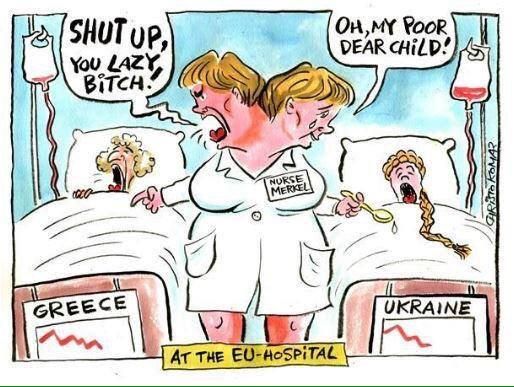IMF: Greece vs. Ukraine
It's getting very hard to ignore the differences between how the international community treats Greece and Ukraine.
For example, consider these headlines:
IMF says can continue to support Ukraine even if debt deal not reached
vs.
IMF Warns No Leeway on Payment as Merkel Urges Greece to Bow
Notice the difference? Lets take this a step further.
Consider how the negotiations have gone.
Ukraine offers creditors 'last chance' to reach deal over debt
vs.
IMF chief Christine Lagarde: Greece must pay up

If you are getting the impression that the cards were stacked against Greece, well, you are right.
The International Monetary Fund “torpedoed” a recent attempt by European Commission chief Jean-Claude Juncker to offer Athens a compromise proposal in tortuous debt talks, a German daily reported.
That isn't the first time that the IMF has worked against Greece. One IMF document proves that.
An IMF document is in the possession of the Greek Audit Commission proving that the creditor knew that the memorandum would increase the Greek debt. The Audit Commission has in its possession a document which shows that the IMF knew from March 2010 that the Greek memorandum would increase Greek debt.
The IMF walked out of negotiations a week ago.
No wonder the Greek Parliament has declared their foreign debts to be odious.
Greece has gone so far as to accuse Europe of plotting regime change. But that's crazy talk, right.
One thing is for certain, things are not well in Greece. Not good at all.
There is no greater metaphor for a country’s health than its own healthcare system. And it is only when you see for yourself the horrors convulsing Greece’s NHS that you realise just how insane it is for this once-proud nation to continue as it is. If it was your country, it would make you weep with pain and shame. In its overloaded hospital wards, I either saw or heard first-hand accounts of babies held hostage for payments and dying patients left unattended; of porters sent out as paramedics, patients told to bring their own sheets, brakes failing on ancient ambulances travelling at high speed and hospitals running out of drugs and dressings.
Five years ago, Greece spent £13 billion on the health of its 11 million population – above the European average. It is now spending about half this. Worse still, in the first four months of this year the 140 state hospitals received just £31 million, a 94% fall on the previous year. And to make matters even blacker, any reserves have just been taken back by the government in its desperate scramble for cash to pay public servants and international debts.
There are claims of an astonishing three-year fall in a Greek person’s life expectancy in just five years since the country’s economy crashed. If confirmed, this would be without precedent in modern Europe. And the individual human stories are pitiful, verging on the macabre.
‘The situation is like a war zone without the bullets,’ said one source at the charity. ‘If things keep going the way they are, we could see a totally collapsing health system.’


Comments
Greek Premier Alexis Tsipras was in Russia today
…giving a speech at the St. Petersburg International Economic Forum:
Greek Premier Alexis Tsipras has said that Europe Union needs to understand that the center of world economic development is shifting to other regions.
Highlighting the role of the new world economic blocs such as regional cooperation in Asia and the BRICS partnership, Tsipras emphasized that the world is multipolar, now.
There is wide speculation that Greece seeks to leave the EU and join the BRICS.
Russia’s Deputy Prime Minister Arkady Dvorkovich has already said that Moscow is ready to consider offering loans to debt-stricken Greece. Greece’s EU and US lenders – the European Central Bank (ECB), the International Monetary Fund (IMF), and the European Commission – refuse to pay Athens the remaining part of the debt-ridden country’s bailout program, saying that the country must first implement further economic reforms.